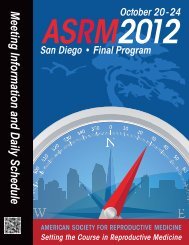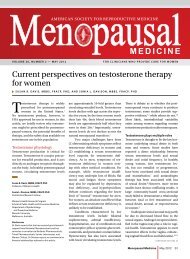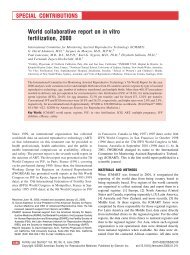scientific program • symposia - American Society for Reproductive ...
scientific program • symposia - American Society for Reproductive ...
scientific program • symposia - American Society for Reproductive ...
Create successful ePaper yourself
Turn your PDF publications into a flip-book with our unique Google optimized e-Paper software.
44 TH ANNUAL POSTGRADUATE PROGRAM<br />
medicine providers and nurse practitioners, will review the use of contraception among women with chronic medical<br />
problems. Compliance and medical eligibility criteria will also be addressed, as well as specific case dilemmas.<br />
LEARNING OBJECTIVES<br />
After participating in this course, participants should be able to:<br />
1. Summarize medical eligibility criteria <strong>for</strong> contraceptive use in the United States.<br />
2. Discuss contraceptive management <strong>for</strong> women with specific chronic medical conditions.<br />
3. List non-birth-control benefits of contraceptives that may improve selected chronic conditions.<br />
________________________________________________________________________________________________________________________<br />
Developed in Cooperation with the Nurses’ Professional Group<br />
FACULTY<br />
Andrea M. Braverman, Ph.D., Chair<br />
Sony Sierra, M.D., M.Sc., Co-Chair<br />
Erin A. Yontz, B.A., M.S.<br />
ACGME COMPETENCY<br />
Patient Care<br />
NEEDS ASSESSMENT AND COURSE DESCRIPTION<br />
Recurrent early pregnancy loss is a devastating condition affecting about 3% of couples trying to conceive. Evaluation and<br />
management of recurrent loss requires a knowledgeable and dedicated interdisciplinary team including physicians, nurses,<br />
psychologists, lab and ultrasound staff. Infertility nurses often act as case managers and play an important role in assisting<br />
in the testing process and providing emotional support <strong>for</strong> these patients. Nurses and other healthcare providers involved<br />
in the care of recurrent pregnancy loss patients should have knowledge of current standards of practice, professional<br />
guidelines, and evidenced-based evaluation and treatment options to optimize care <strong>for</strong> these vulnerable couples.<br />
This one-day postgraduate course will assist nurses and other healthcare providers with the management of recurrent<br />
pregnancy loss (RPL) and will include topics such as the evidence-based evaluation and treatment, psychological and<br />
social impact, and the important nursing implications of caring <strong>for</strong> the patient with RPL.<br />
LEARNING OBJECTIVES<br />
After participating in this course, participants should be able to:<br />
1. Define early pregnancy loss and describe the incidence and etiology of this condition.<br />
2. Summarize evidence-based evaluation and treatment of recurrent early pregnancy loss to optimize care <strong>for</strong> these<br />
vulnerable couples.<br />
3. Describe the role of the nurse in the evaluation, treatment and emotional support of patients with recurrent pregnancy<br />
loss.<br />
________________________________________________________________________________________________________________________<br />
Developed in Cooperation with the <strong>Society</strong> <strong>for</strong> Male Reproduction and Urology<br />
FACULTY<br />
Robert E. Brannigan, M.D., Chair<br />
Sjoerd Repping, M.D.<br />
Paul J. Turek, M.D.<br />
Daniel H. Williams, M.D.<br />
ACGME COMPETENCY<br />
Patient Care<br />
NURSING IMPLICATIONS FOR RECURRENT PREGNANCY LOSS<br />
Course PG14 (Sunday) <strong>•</strong> ROOM 324 C/D<br />
FERTILITY PRESERVATION IN THE MALE: FROM CHILDHOOD TO ADULTHOOD, STEM CELLS TO SPERMATOZOA<br />
Course PG15 (Sunday) <strong>•</strong> ROOM 324 G/H CME<br />
NEEDS ASSESSMENT AND COURSE DESCRIPTION<br />
Male fertility preservation is much more complex than just sperm banking in the adult oncology patient. A comprehensive<br />
fertility preservation <strong>program</strong> should be able to address all males from childhood through adulthood and all types of cells<br />
from spermatogonial stem cells to motile spermatozoa. However, very few of these comprehensive <strong>program</strong>s exist, due to a<br />
definite gap in knowledge, competence and per<strong>for</strong>mance.<br />
This course <strong>for</strong> several different types of clinicians, including urologists, reproductive endocrinologists, geneticists, social<br />
workers and embryologists, will address a far-reaching array of subjects, all centered on the theme of fertility preservation<br />
in the male. Topics to be covered in detail include: definition of the scope of the issue; prepubertal testis tissue harvesting<br />
50<br />
CE








